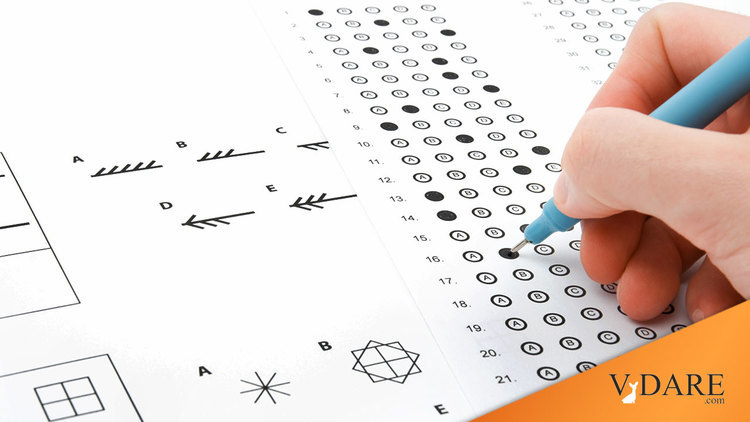
Does IQ Testing Work Or Not Work? Yes!
By Steve Sailer
07/08/2013
My previous post (on my own blog) cites an interesting new study of brain development that begins:
“IQ predicts many measures of life success …
Here’s an article in Salon by the author of a new book on the failures of IQ testing, which appears to be aimed at upper middle class parents of kids who are having trouble in school:
IQ tests hurt kids, schools — and don’t measure intelligence
The research proves that IQ tests poorly predict learning disabilities. So why are schools still using them?
BY SCOTT BARRY KAUFMAN
July 7, 2013
Can IQ testing both "predict" and "poorly predict" at the same time?
Can a glass be half full and half empty at the same time?
If it’s your kid, of course you want more detail. You want to know your child’s strengths as well as weaknesses. But one number IQ scores also have their uses, especially in social sciences when thinking about groups.
Back in 2007, I wrote up a Frequently Asked Questions list for IQ that discussed some of these issues:
Q. So, do IQ tests predict an individual’s fate?
A. In an absolute sense, not very accurately at all. Indeed, any single person’s destiny is beyond the capability of all the tests ever invented to predict with much accuracy.
Q. So, if IQ isn’t all that accurate for making predictions about an individual, why even think of using it to compare groups, which are much more complicated?
A. That sounds sensible, but it’s exactly backwards. The larger the sample size, the more the statistical noise washes out.
Q. How can that be?
A. If Adam and Zach take an IQ test and Adam outscores Zach by 15 points, it’s far from impossible that Zach actually has the higher "true" IQ. A hundred random perturbations could have thrown the results off. Maybe if they took the test dozen times, Zach just might average higher than Adam.
But for comparing the averages of large groups of people, the chance of error becomes vanishingly small. For example, the largest meta-analysis of American ethnic differences in IQ, Philip L. Roth’s 2001 survey,[Ethnic group differences in cognitive ability in employment and educational settings: a meta-analysis, Personnel Psychology 54, 297–330.] aggregated 105 studies of 6,246,729 individuals. That’s what you call a decent sample size.
Q. So, you're saying that IQ testing can tell us more about group differences than about individual differences?
A. If the sample sizes are big enough and all else is equal, a higher IQ group will virtually always outperform a lower IQ group on any behavioral metric.
One of the very few positive traits not correlated with IQ is musical rhythm — which is a reason high IQ rock stars like Mick Jagger, Pete Townshend, and David Bowie tell Drummer Jokes.
Of course, everything else is seldom equal. A more conscientious group may well outperform a higher IQ group. On the other hand, conscientiousness, like many virtues, is positively correlated with IQ, so IQ tests work surprisingly well.
Q. Wait a minute, does that mean that maybe some of the predictive power of IQ comes not from intelligence itself, but from virtues associated with it like conscientiousness?
A. Most likely. But perhaps smarter people are more conscientious because they are more likely to foresee the bad consequences of slacking off. It’s an interesting philosophical question, but, in a practical sense, so what? We have a test that can predict behavior. That’s useful.
Q. Can one number adequately describe a person’s intelligence?
A. Sort of.
Q. "Sort of"?!? What the heck kind of answer is that?
A. A realistic one.
Q. How can something be true and not true at the same time?
A. How can the glass be half-full and half-empty at the same time? Most things about IQ testing are partly true and partly false at the same time. That’s the nature of anything inherently statistical, which is most of reality.
Humans are used to legalistic reasoning that attempts to draw bright lines between exclusive categories. For example, you are either old enough to vote or you aren’t. There’s no gray area. But the law is artificial and unlike most of reality. Many people have a hard time dealing with that fact, especially when it comes to thinking about IQ.
Q. Enough epistemology! How can you rationalizing summing up something as multifaceted as intelligence in a single number?
A. Think about SAT scores. Your total score says something about you, while breaking out your Math and Verbal scores separately says more. A kid who gets a total of 1400 out of 1600 (Math + Verbal) is definitely college material, while a kid who gets a 600 isn’t. That’s the big picture. For the fine detail, like which college to apply to, it helps to look at the subscores. A kid with a 1400 who got a 600 Math and an 800 Verbal would be better off at Swarthmore than at Cal Tech.
A few years ago, the SAT added a third score, Writing, but many colleges aren’t sure how useful it is, and there’s some sentiment for dropping the Writing test as not worth the extra time or cost. In other words, there are diminishing marginal returns to more detail.
By the way, the FAQ was a mainstay of the Usenet era of Internet discussion groups before the invention of the World Wide Web. It was widely considered a terrific way to bring people up to speed. Yet, in this century, FAQs seem to have fallen dramatically out of fashion. Why? Does it have something to do with the rise of Wikipedia?
The dialogue format for written instruction of difficult material has fallen in and out of favor over the ages. Plato and Galileo used it well, but at the moment it seems to be just not done.
